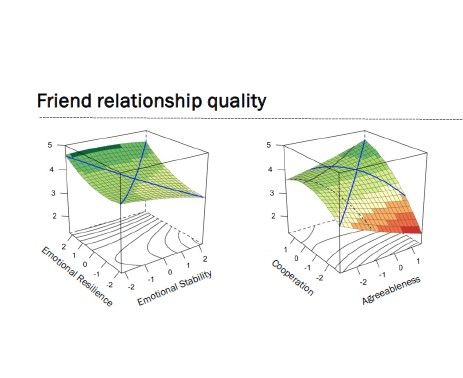Kids whose skills increased over time also experienced positive life outcomes, including better academic engagement, friendship quality, and well-being. So skill changes matter for adolescents' success.

Kids whose skills increased over time also experienced positive life outcomes, including better academic engagement, friendship quality, and well-being. So skill changes matter for adolescents' success.
Most Big Five personality traits did *not* show mean-level change or individual differences in change. So it seems easier for skills to change than traits.
Most Big Five personality traits did *not* show mean-level change or individual differences in change. So it seems easier for skills to change than traits.
There were significant individual differences in change for all five skill domains: self-management, social engagement, cooperation, emotional resilience, and innovation skills. So some kids increased over time, while others decreased.

There were significant individual differences in change for all five skill domains: self-management, social engagement, cooperation, emotional resilience, and innovation skills. So some kids increased over time, while others decreased.
Success in adolescence isn't just about sticking to your personality. Social, emotional, and behavioral skills can help kids adapt and thrive, even when stepping out of their comfort zone.
Want to know more? Check out the full paper!
osf.io/d2z5b/downlo...
Success in adolescence isn't just about sticking to your personality. Social, emotional, and behavioral skills can help kids adapt and thrive, even when stepping out of their comfort zone.
Want to know more? Check out the full paper!
osf.io/d2z5b/downlo...
* High cooperation and emotional resilience skills helped counteract low trait agreeableness and emotional stability in managing friendships.
* High innovation skills (like creativity and cultural competence) outweighed trait open-mindedness in predicting multiple outcomes.

* High cooperation and emotional resilience skills helped counteract low trait agreeableness and emotional stability in managing friendships.
* High innovation skills (like creativity and cultural competence) outweighed trait open-mindedness in predicting multiple outcomes.
Skills = what you *can do* when needed.
They're not always perfectly aligned, and mismatches matter. Adolescents with higher skills than traits--who can "rise to the occasion"--fared better across academic, social, and emotional domains.
Skills = what you *can do* when needed.
They're not always perfectly aligned, and mismatches matter. Adolescents with higher skills than traits--who can "rise to the occasion"--fared better across academic, social, and emotional domains.


